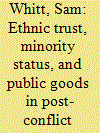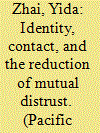|
|
|
Sort Order |
|
|
|
Items / Page
|
|
|
|
|
|
|
| Srl | Item |
| 1 |
ID:
147696


|
|
|
|
|
| Summary/Abstract |
Across one longitudinal and two cross-sectional surveys in Northern Ireland, we tested a model of intergroup relations in which out-group attitudes and behavioral tendencies are predicted by cross-group friendship and positive intergroup appraisals, mediated by intergroup emotions and out-group trust. In study 1, out-group friendship at time 1 predicted out-group trust at time 2 (one year later), controlling for prior out-group trust. In study 2, positive and negative intergroup emotions mediated the effects of friendship on positive and negative behavioral tendencies and attitudes. In study 3, a confirmatory factor analysis indicated that trust and emotions are distinct constructs with unique predictive contributions. We then tested a model in which cross-group friendship predicted intergroup emotions and trust through intimate self-disclosure in out-group friendships. Our findings support an integration of an intergroup emotions framework with research highlighting the importance of cross-group friendship in fostering positive intergroup outcomes.
|
|
|
|
|
|
|
|
|
|
|
|
|
|
|
|
| 2 |
ID:
102493


|
|
|
|
|
| Publication |
2011.
|
| Summary/Abstract |
Conflict between states, as well as between governments and non-state actors, continues to pose one of the most serious threats to individuals in the international community today. In an effort to reduce the destruction caused by these conflicts, a number of interventions, processes, and conflict management methods have been attempted. One of these methods involves facilitating conditions for positive contact between the disputants thus enabling them to develop a rapport of some sort. While this idea has received widespread theoretical support, there is little empirical analysis considering the benefits of such an approach. Here we examine how the context in which contact occurs can affect conflict management; we outline the assumptions that underpin conditions of the context, and discuss strategies, such as interactive problem solving, that have at their heart the goal of improving conditions of contact and communication as a prelude to conflict resolution. Our research goes beyond most studies, in that we subject the ideas of various conditions of contact and communication to an empirical test. We develop specific hypotheses on the role and relevance of the conditions of contact, and investigate the extent to which conflict management techniques can create positive conditions to contribute to conflict resolution. An original dataset including various conflict management techniques is examined to analyze our hypotheses. Findings indicate that factors such as the rank of a mediator and the type of conflict are more significant predictors of successful conflict management than the involvement of a third party facilitator. We examine both interstate conflicts and civil conflict to determine whether these different types should be managed differently.
|
|
|
|
|
|
|
|
|
|
|
|
|
|
|
|
| 3 |
ID:
182684


|
|
|
|
|
| Summary/Abstract |
This study considers how ethnic trust and minority status can impact the ability of ethnic groups to pursue cooperative public goods, focusing on groups with a history of conflict and lingering hostility. A public good experiment between ethnic Albanians and Serbs in postwar Kosovo reveals that subjects contribute far more to a mutually beneficial public good when they are part of an experimentally induced coethnic majority. However, when in the minority, subjects not only underinvest, but many actively divest entirely, privatizing the public good. Majority/minority status also has wide-ranging implications for how individuals relate to real-world public goods and the institutions of government that provide them. Compared to majority Albanians, survey data indicate how minority Serbs in Kosovo express greater safety and security concerns, feel more politically, socially, and economically excluded, are more dissatisfied with civil liberties and human rights protections, and are less likely to participate politically or pay taxes to support public goods. Conflict-related victimization and distrust of out-groups are strong predictors of these minority group attitudes and behaviors. This suggests a mechanism for how conflict amplifies out-group distrust, increasing parochial bias in public good commitments, especially among minorities who are wary of exploitation at the hands of an out-group majority. To restore trust, this study finds that institutional trust and intergroup contact are important to bridging ethnic divides that inhibit public good cooperation.
|
|
|
|
|
|
|
|
|
|
|
|
|
|
|
|
| 4 |
ID:
151439


|
|
|
|
|
| Summary/Abstract |
In the midst of rising tension between China and Japan, two powerful countries in Asia, the favorable attitudes of each country's citizens toward the other country have dropped to a historical low. The Taiwan issue, historical legacy, island disputes, and maritime resource competition are major obstacles in Sino-Japanese relations, but the most fundamental issue is a deep-seated mutual distrust and suspicion between the two countries, which result in rising threat perceptions. Beyond the structural and political elite-centered approaches, this study examines the evidence related to the three approaches (face-to-face contact, cross-cultural exposure, and social identity) to reduce mutual distrust and antipathy in the two countries. With a careful analysis of the survey data, this study sheds light on the conditions under which contact (a) results in improved attitudes toward outgroup, (b) has little or no effect on intergroup relations, and (c) yields more prejudice and hostility toward the outgroup. The findings of this study not only identify factors that could facilitate mutual understanding between Chinese and Japanese people and more favorable impressions of one another, but are also relevant to planning interventions to reduce prejudice and distrust among people from different races, religions, and countries.
|
|
|
|
|
|
|
|
|
|
|
|
|
|
|
|
|
|
|
|
|